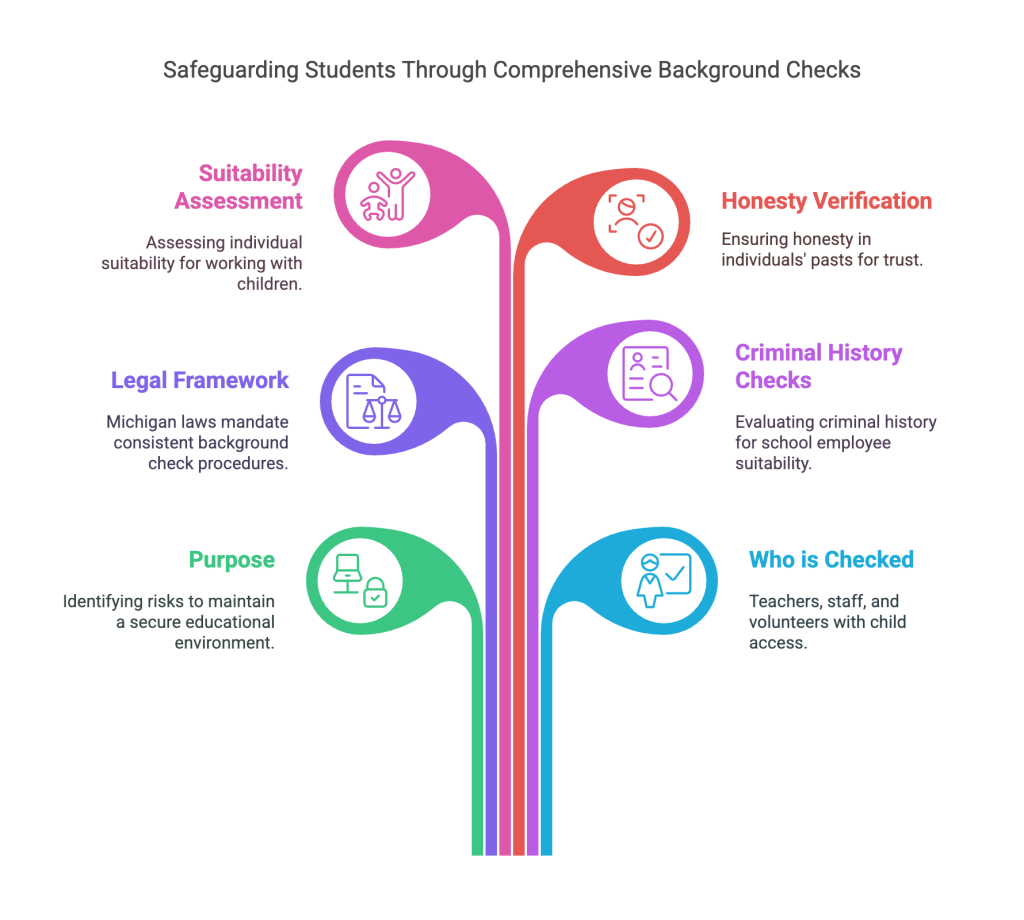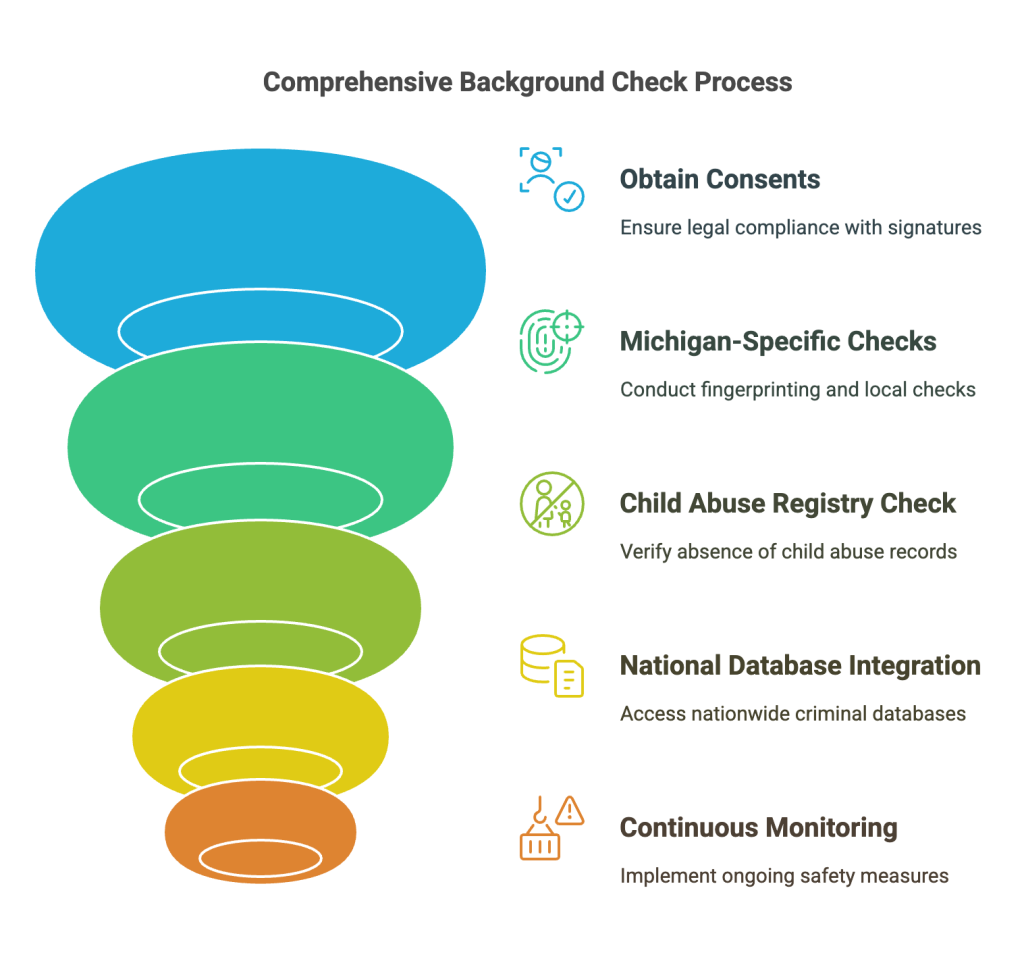Ensuring the safety of students in Michigan's educational institutions is a top priority. Therefore, comprehensive background checks have become an essential part of the hiring process in the Michigan education sector. From thorough fingerprinting procedures to checks against the child abuse registry, these measures aim to create secure learning environments. This guide delves deep into the intricacies of Michigan school background checks, shedding light on the laws, procedures, and implications for educators and institutions alike.
Key Takeaways
- Background checks in Michigan schools are essential for ensuring a safe environment by verifying the trustworthiness of staff and volunteers.
- The background check process includes mandatory fingerprinting and child abuse registry checks for educators and volunteers.
- Schools must follow strict legal and ethical guidelines to protect applicant privacy and comply with federal and state laws.
- Implementing background checks can face challenges like processing delays and false positives, but solutions include early planning and better appeals processes.
- Background checks have been shown to significantly reduce safety incidents in schools, highlighting their importance in protecting students.
Introduction
In the landscape of educational safety, background checks are indispensable. You need them to create a secure environment in Michigan schools. Every school district in Michigan faces the challenge of ensuring that staff and volunteers are trustworthy. Background checks act as a crucial filter, protecting students from potential threats.
This article will walk you through the specifics of Michigan's background check process. Expect insights on key components like fingerprinting and child abuse registry checks. We'll also delve into legal and ethical considerations, ensuring you understand the implications for schools and applicants. By the end, you'll have a clearer picture of how these checks contribute to safer schooling environments in Michigan.
Understanding Michigan School Background Checks
School background checks are designed to safeguard students and create a secure educational atmosphere. These checks require assessing criminal history, evaluating suitability for working with children, and ensuring honesty in one's past. The purpose is to identify any red flags that might pose risks in a school environment. Schools aim to protect students from potential harm while fostering trust in educators and staff.
Who must undergo these checks? The list includes teachers, administrative personnel, and volunteers. Essentially, anyone with regular access to children in a school setting falls under this requirement. This wide net ensures that every adult on campus contributes to a safe environment.

The legal framework in Michigan mandates these checks. State laws outline strict procedures for vetting individuals working in schools. For instance, Public Act 129 of 2005 requires criminal history checks for all school employees. This legislation ensures consistent screening across the state, with specific provisions tailored for educational settings. The law not only emphasizes criminal checks but also addresses how frequently these checks must be updated. This cohesive legal framework forms the backbone of school safety efforts in Michigan.
Key Components of Michigan School Background Checks
Michigan school background checks rest on two main pillars: fingerprinting and the child abuse registry check. Each serves a unique purpose in ensuring that those serving students are fit for their roles.
MI School Fingerprinting
Fingerprinting stands as a core element of the background check process. In Michigan, all school employees, from teachers to volunteers, must undergo fingerprinting through the Live Scan system. This electronic process captures prints efficiently and submits them to the Michigan State Police and the FBI for a comprehensive criminal history check.
Here's how the fingerprinting process works:
- Schedule an Appointment: You must first schedule a fingerprinting appointment with an approved vendor.
- Live Scan Fingerprinting: At the appointment, a technician captures your fingerprints electronically, a process that reduces errors common with traditional ink methods.
- Submission and Processing: The fingerprints are sent automatically to relevant databases. The Michigan State Police and FBI process these and return results within a few days.
The outcome of this fingerprinting process carries significant legal weight. A clean report acts as a green light for employment. Meanwhile, any discrepancies might require further investigation or discussion. For individuals, itâs crucial to ensure the accuracy of your fingerprintsâprints with smudges or unclear lines can lead to delays or resubmissions.
Child Abuse Registry in Michigan
The Child Abuse Registry serves to protect children by identifying individuals with substantiated allegations of child abuse or neglect. Schools are required to check this registry before hiring or approving volunteers.
The registry check process involves:
- Consent of the Applicant: You must consent to your name being checked against the registry. Without consent, the process cannot move forward.
- Submission of Information: After consent, your identifying details are submitted to the registry for a thorough check against existing records.
- Analysis of Results: Schools receive the results, which outline any link to child abuse cases. A hit on the registry doesnât necessarily terminate the hiring process but prompts a deeper investigation.
Each check aims to ensure school environments remain safe spaces for students. These measures might feel stringent, but rememberâthey serve to prioritize student well-being. As you navigate through these steps, consider what these requirements mean not only for policy adherence but also for the broader implications on safety in educational contexts. Is your institution leveraging these checks effectively to foster a secure environment?
Performing a Comprehensive Background Check
Running a comprehensive background check in Michigan's education sector involves a structured process. To start, confirm that you have all necessary consents and disclosures signed by the applicant. This ensures compliance with both state and federal laws like the Fair Credit Reporting Act (FCRA). Once these are secured, the process typically involves several key steps.

First, conduct Michigan-specific checks, including fingerprinting. This requires scheduling an appointment with an authorized fingerprinting service. Ensure applicants bring valid identification. Fingerprints are then run through the Michigan State Police database and the FBI for criminal history screening.
Next, checks against the Child Abuse Registry are crucial. Schools access this confidential database to identify any records of child abuse which might disqualify an applicant. The registry process is straightforward; schools submit a request form with the candidateâs details and usually receive results within days.
Integration with national databases follows. This step strengthens the vetting process by pulling records from the National Crime Information Center and other nationwide criminal databases. By doing so, you catch offenses the state-only check might miss, offering peace of mind that all bases are covered.
To maintain safety, continuous monitoring practices are essential. Set up procedures to run periodic checks on employees. Implement systems for immediate notification of any new legal issues. This proactive approach keeps schools informed and responsive to potential threats in real time.
By executing these steps diligently, you ensure the integrity of the hiring process in Michiganâs educational institutions. As you manage these checks, consider how diligent follow-through could positively affect your school's community. Would adopting more robust monitoring tools benefit your processes? Can enhancing database access ensure safer learning environments? Reflecting on these questions helps you refine your background check strategy.
Legal and Ethical Considerations
When it comes to background checks in Michigan's schools, following the law is crucial. Schools must comply with state and federal guidelines, like those set by the U.S. Department of Labor. This ensures that the process is fair, consistent, and legal. Non-compliance can lead to legal issues or financial penalties.
Privacy is a big concern. Handling sensitive information means schools must protect it from unauthorized access. The ethical implications are significant; mishandling data can lead to identity theft or discrimination. Schools should implement strict data protection measures to safeguard applicants' information.
Applicants have rights too. They can request to see their background check results and challenge any inaccuracies. This is vital because errors can cost someone their job opportunity. Being aware of these rights helps you take control if you're ever in this situation. Schools must inform applicants of these rights and give them the chance to correct any mistakes.
Balancing safety with legal and ethical responsibilities is not simple but necessary. Adhering to legal standards and respecting individual rights ensures an effective and just background check process.
Challenges and Solutions in Implementing School Background Checks
Schools often run into several barriers when implementing background checks. One common challenge is the delay in processing. Background checks, especially those involving fingerprinting, can take weeks. This lag can leave schools understaffed or oblige them to make hiring decisions without complete information. Addressing this issue may require schools to plan their hiring processes well in advance and consider temporary staffing solutions while awaiting results.
Another challenge involves false positives, particularly in cases where common names lead to mismatches in the database. This can incorrectly flag a potential hire and cause unnecessary delays. One solution is to use additional personal identifiers, like birthdates, to cross-check records. Schools may also benefit from implementing a more robust appeals process that allows candidates to clarify any discrepancies.
Cost is yet another obstacle. Background checks can be expensive, especially for smaller schools with tight budgets. Schools can explore grants or state funding specifically allocated to support safer hiring practices.
Technology plays a vital role in improving these processes. Automated systems and digital fingerprints can significantly reduce processing time, making the process less cumbersome. Partnering with vendors who provide real-time updates and electronic processing can simplify coordination and tracking.
Collaboration with state and federal authorities may further streamline the process. By synchronizing efforts across local, state, and national levels, information flow becomes more consistent and reliable.
By addressing these challenges with targeted solutions, schools can enhance their safety protocols efficiently and effectively. What systems can your school introduce today to improve its hiring process tomorrow?
Impact of Background Checks on School Safety
Background checks play a crucial role in maintaining safety within Michigan schools. Looking at specific cases can illustrate their effectiveness. In one public school district, a thorough check revealed a candidate had a history of violence, leading to withdrawal of the job offer. This swift action prevented potential harm, demonstrating the direct impact background checks have on keeping students safe.
The numbers also tell a compelling story. According to a recent study, schools implementing comprehensive background checks reported a 30% reduction in safety incidents. This data underscores the value of these checks in establishing a secure environment.
It's important to ask yourself: How would student safety be affected without these checks? In a landscape where every precaution counts, background checks act as a vital line of defense, ensuring that those entrusted with educating and caring for students are thoroughly vetted. They don't guarantee absolute safety, but they undeniably enhance it, reducing risks and fostering a safer learning atmosphere.
Conclusion
Background checks are crucial for maintaining safe schools in Michigan. They ensure only qualified individualsâthose who can be trusted with students' well-beingâare allowed within educational environments. This isn't just a legal mandate; it's a cornerstone of protecting our children.
Staying informed about the latest legal requirements and procedural improvements in background checks is key. Schools need to regularly update their policies to reflect changes in laws and best practices. Ensuring thorough checks require ongoing diligence.
Building a secure educational environment takes commitment from every stakeholder. With strong background check systems, Michigan schools can look forward to a future where student safety is prioritized and upheld by all involved.
Further Readings
Resources that can offer further insights into the nuances of background checks in Michigan's education sector include a combination of authoritative government websites and specialized industry portals. For detailed guidelines on fingerprints and screening requirements, consult the Michigan State Police website which offers an array of up-to-date resources and procedural guides.
For broader employment screening topics, the U.S. Equal Employment Opportunity Commission (EEOC) website provides federal guidelines that can help you understand how these practices align with anti-discrimination laws.
Colleagues or individuals who wish to explore case studies or peer discussions can turn to industry blogs like the Society for Human Resource Management (SHRM) which regularly posts articles and reports on HR policies, including background screening.
Lastly, delving into research and reports from organizations such as National Association of Professional Background Screeners (NAPBS), now known as the Professional Background Screening Association (PBSA), can offer you a wider range of perspectives and professional practices within the background check industry. Each of these resources helps enhance your understanding and application of comprehensive background checks within educational settings.
Frequently Asked Questions (FAQs)
What disqualifies you from working in Michigan schools?
Certain criminal offenses, such as violent crimes or offenses against children, can disqualify you from working in Michigan schools.
How long do Michigan school checks take?
Background checks typically take a few days to a week to process.
Are volunteers required to have background checks in Michigan?
Yes, volunteers are generally required to undergo background checks to ensure the safety of students.
Can a DUI affect school employment in Michigan?
Yes, a DUI can impact your eligibility for employment, depending on the school's policies and the circumstances of the offense.
How to appeal a denied school clearance in Michigan?
You can appeal by submitting a written request for reconsideration to the relevant school district or the Department of Education.
Do Michigan private schools follow the same rules?
Private schools may have different policies, but they often follow similar procedures for background checks.
Are expunged records visible to Michigan schools?
Expunged records are generally not visible during background checks for school employment.
Whatâs the cost of school fingerprinting in Michigan?
The cost varies but generally ranges from $50 to $70 for fingerprinting services.
How often must school employees renew checks?
School employees typically undergo background checks every five years.
Does Michigan check out-of-state abuse registries?
Yes, Michigan may check out-of-state abuse registries as part of the background check process.
Are substitute teachers subject to the same checks as full-time teachers?
Yes, substitute teachers must undergo the same background checks as full-time teachers.
What is the process for a Michigan school background check?
The process involves fingerprinting, a criminal background check, and evaluation of any findings by the school board.
Can juvenile offenses affect future school employment in Michigan?
Juvenile offenses may affect employment if they are severe or have been transferred to adult court.
Do school transportation staff undergo different checks?
No, transportation staff are subject to the same background checks as other school employees.
Definitions
Background Check
A background check is a review of a person's criminal, employment, and sometimes financial history. Schools use it to decide if someone is fit to work around students. In Michigan, this includes fingerprinting and checks against the Child Abuse Registry. It's a key step in hiring teachers, staff, and volunteers.
Fingerprinting
Fingerprinting is the process of electronically capturing an individualâs fingerprints for identity verification. Michigan schools require it as part of employee screening. The fingerprints are then matched against state and federal criminal databases. It's used to confirm a person's criminal history, if any.
Child Abuse Registry
The Child Abuse Registry is a confidential state database that lists individuals with substantiated cases of child abuse or neglect. Michigan schools must check this registry before hiring someone to work with children. A match may lead to disqualification, depending on the case details.
Fair Credit Reporting Act (FCRA)
The FCRA is a federal law that governs how background information is collected and used. It gives applicants rights, like being notified if a report affects a hiring decision and the ability to dispute errors. Michigan schools must follow it when running background checks.
Consent Form
A consent form is a document the applicant signs to allow the school to run a background check. Without it, the screening cannot legally proceed. It ensures transparency and protects the rights of the person being screened. Always review what you're agreeing to before signing.

GCheck Editorial Team
Meet the GCheck Editorial Team, your trusted source for insightful and up-to-date information in the world of employment background checks. Committed to delivering the latest trends, best practices, and industry insights, our team is dedicated to keeping you informed.
With a passion for ensuring accuracy, compliance, and efficiency in background screening, we are your go-to experts in the field. Stay tuned for our comprehensive articles, guides, and analysis, designed to empower businesses and individuals with the knowledge they need to make informed decisions.
At GCheck, we're here to guide you through the complexities of background checks, every step of the way.






